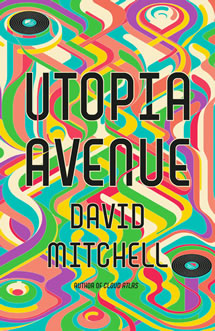Reviewed by Robert Goodman.
By David Mitchell, Sceptre, $32.99.
 David Mitchell is best known for his time-spanning and globetrotting novels with a metaphysical and speculative edge Cloud Atlas and The Bone Clocks. But his works are more diverse than this and include the memoire-like Black Swan Green and the historical (but no less metaphysical) The Thousand Autumns of Jacob De Zoet. What regular readers of Mitchell’s works will know is that all of these, and his other novels, are connected. Characters drift in and out of the different narratives and there is grand, overarching meta-tale that involves a kind of battle between good and evil, sometimes going on in the background and sometimes in the foreground. Utopia Avenue, Mitchell’s latest, is definitely part of the Mitchell-verse, but also tells a fairly self-contained story set in around the music scene of late 1960s London.
David Mitchell is best known for his time-spanning and globetrotting novels with a metaphysical and speculative edge Cloud Atlas and The Bone Clocks. But his works are more diverse than this and include the memoire-like Black Swan Green and the historical (but no less metaphysical) The Thousand Autumns of Jacob De Zoet. What regular readers of Mitchell’s works will know is that all of these, and his other novels, are connected. Characters drift in and out of the different narratives and there is grand, overarching meta-tale that involves a kind of battle between good and evil, sometimes going on in the background and sometimes in the foreground. Utopia Avenue, Mitchell’s latest, is definitely part of the Mitchell-verse, but also tells a fairly self-contained story set in around the music scene of late 1960s London.
Utopia Avenue opens frenetically. It is 1967, bass guitarist Dean Moss is scammed out of his last few pounds, evicted from his squalid lodgings and is on the verge of having to sell his bass guitar. A chance meeting with an up and coming American impresario Levon Frankland (for those paying attention, a character who turns up much later in life in The Bone Clocks), changes his life. Frankland introduces Dean to savant and neuro-atypical guitarist Jasper De Zoet and Yorkshire drummer Peter ‘Griff’ Griffin, and not much later he brings the three of them together with folk singer and pianist Elf Holloway. Despite their very different musical styles, Frankland believes that together they have the right sound to break into an industry that at the time was celebrating artists like The Beatles, The Rolling Stones and a young David Bowie. And despite some early setbacks, slowly their star starts to rise.
The plot of Utopia Avenue is a fairly standard one (think The Commitments). Mitchell gives each of his main characters/band members some backstory to work through, the hook being that each episode of their lives provides the inspiration for a song. The book is structured around the band’s three albums and the songs/events that made them up. For De Zoet, this story involves a knocking in his head and a supernatural family legacy that goes back to his ancestor Jacob, although detailed familiarity with that story is not necessary. Readers unfamiliar with that story can easily skate over this plotline and write it off as a characters dealing with mental illness.
Mitchell himself has observed, and one of his characters repeats, the aphorism that writing about music is like “dancing about architecture”. It’s a tough sell and few authors have done it successfully. And while Mitchell manages to capture the musical zeitgeist of the late 1960s, and references plenty of musical influences on his characters, it is difficult to really conceptualise the music itself. This is not helped by the ultimate revelation of the lyrics of some of Utopia Avenue’s hit songs. While the conceit of having those lyrics emerge directly from the experiences of their writers is a strong one, they, like much rock music then and since, come across as extremely trite when not set to music. It is often the music and the vocalisation that gives these words their power and that is missing when it is captured in prose.
Utopia Avenue is also stuffed full of cameos. By the end of the book it feels like the band members have met every famous English and American musician and band of the time including David Bowie, John Lennon, Leonard Cohen, Mama Cass. The full list of musicians met or referenced is staggering. And while at first it feels like it is grounding the whole endeavour in reality, it is not long before these cameos starts to feel a little gratuitous.
Quibbles aside though, Mitchell fully dives in to the period, its key locales and figures, to present a fascinating time in musical and cultural history. Mitchell fans will be gratified by the sheer number of references to previous books, characters and events. But they are sufficiently left in the background for casual readers to completely ignore them and still enjoy the ride (although even first time Mitchell readers might find their antennae quivering when one character listens to the Cloud Atlas Quartet). Overall this is one of Mitchell’s most accessible and joyful novels.
This and 500 more reviews can be found at www.pilebythebed.com.











